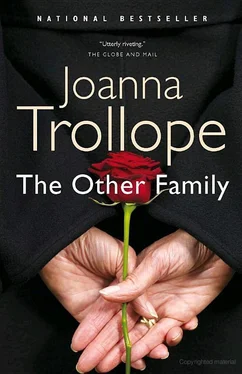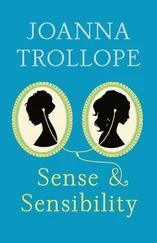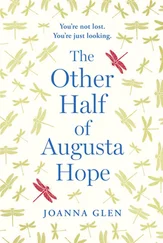Joanna Trollope - The Other Family
Здесь есть возможность читать онлайн «Joanna Trollope - The Other Family» весь текст электронной книги совершенно бесплатно (целиком полную версию без сокращений). В некоторых случаях можно слушать аудио, скачать через торрент в формате fb2 и присутствует краткое содержание. Жанр: Старинная литература, на английском языке. Описание произведения, (предисловие) а так же отзывы посетителей доступны на портале библиотеки ЛибКат.
- Название:The Other Family
- Автор:
- Жанр:
- Год:неизвестен
- ISBN:нет данных
- Рейтинг книги:5 / 5. Голосов: 1
-
Избранное:Добавить в избранное
- Отзывы:
-
Ваша оценка:
- 100
- 1
- 2
- 3
- 4
- 5
The Other Family: краткое содержание, описание и аннотация
Предлагаем к чтению аннотацию, описание, краткое содержание или предисловие (зависит от того, что написал сам автор книги «The Other Family»). Если вы не нашли необходимую информацию о книге — напишите в комментариях, мы постараемся отыскать её.
The Other Family — читать онлайн бесплатно полную книгу (весь текст) целиком
Ниже представлен текст книги, разбитый по страницам. Система сохранения места последней прочитанной страницы, позволяет с удобством читать онлайн бесплатно книгу «The Other Family», без необходимости каждый раз заново искать на чём Вы остановились. Поставьте закладку, и сможете в любой момент перейти на страницу, на которой закончили чтение.
Интервал:
Закладка:
Can’t you just try and understand that?’
Chrissie closed her eyes.
‘I am trying—’
‘OK.’
‘Those people—’
‘Don’t cal them that,’ Amy said sharply.
‘You might like it up there—’
Amy sighed. She put a hand out and squeezed Chrissie’s arm.
‘Yes, I might. But I’m your daughter and I grew up here .’
Chrissie gave herself a shake.
‘I know.’ She glanced at Amy. ‘I never thought you’d want to.’
‘That’s unfair—’
‘Is it?’
‘Yes,’ Amy said, ‘you know it is.’
‘Darling, it’s just that I—’
Amy put her hands over her ears.
‘Sorry, Mum, but don’t say it. Don’t say it again. We know how it is for you. It isn’t much of a picnic for us either.’
‘No.’
‘OK, then?’
‘About Newcastle?’
‘Yes.’
Chrissie said reluctantly, ‘I suppose so.’
‘Good,’ Amy said. She picked up her tea mug. ‘Because I’m going, anyway.’
Sitting on the tube on the way back from col ege, Dil y read Craig’s text probably twenty-five times.
‘Sorry babe,’ it started, and then, without any punctuation, it went on, ‘sorry cant do friday sorry cant do have a nice life,’ and two kisses. Of course she knew, at about the second reading, what he was trying to say, trying to tel her, but it wasn’t until she read it ten more times, scrol ing endlessly back to the beginning, that she al owed herself to realize that she was, unceremoniously, being dumped. That Craig, lazy, undependable, fanciable Craig, was taking the ultimately cowardly way out of an unwanted situation and was tel ing her that their relationship, as far as he was concerned, was over – by text.
Once she had permitted ful recognition of both his message and his conduct, Dil y waited to fal to pieces. After al , that is what she did when faced with something unwanted or unexpected, what she had always done, and even if this news was hardly unexpected, it was certainly not what she would have chosen. It was also outrageously humiliating. Dil y sat in her seat between a girl with her MP3 player plugged in and an old man in a fez reading an Arabic newspaper and waited for the ful horror of what she had just read to sink right in and reduce her to tears. It didn’t happen.
She reread the text a few more times and waited a bit longer. Stil , nothing happened. She glanced around her and saw that the world she would have assumed to look entirely distorted and unfamiliar through her own shock appeared perfectly normal. She looked down at her phone again.
Perhaps she real y was in shock, and in a few minutes or hours the reality of what had happened would kick in, and she could react as she usual y did with al the attendant panic and sobbing.
She reached Archway station stil in one piece, and got off the train. On the way up to the street, she found she had put her phone in her pocket, as if it was a perfectly ordinary day in which she had received perfectly ordinary messages. Once outside, she resisted buying a gossip magazine and a packet of M&Ms – economy, economy – and started to walk up the hil , past the hospital, past the entrance to Waterlow Park, where, on a bench soon after Richie died, Craig had presented her with a pretty – but cheap – bead bracelet, which was, she reflected, about the only thing he had ever given her, towards the estate agent’s office where Tamsin worked.
It did not cross her mind that Tamsin might not be there and so she was not in the least surprised to find her behind the reception desk, hair in a neat knot behind her head, being busy in a way peculiar to herself. Dil y put her forearms on the high rim of the desk and leaned forward.
‘Hi.’
Tamsin did not take off her telephone headphones. She flicked a glance sideways, towards the big modern clock on the wal .
‘Not til half past five—’
Dil y took her phone out of her pocket and held it for Tamsin to see.
‘Something to show you—’
‘Not now.’
‘Tam, it’s important . It’s Craig.’
Tamsin leaned forward.
‘I don’t care,’ she said in a loud whisper, ‘if it’s Brad Pitt. I am not talking to you til half past five. Ten minutes. Go and sit down.’
Dil y sighed, and put the phone back in her pocket. She trailed across to a pair of red upholstered chairs by a glass table bearing brochures featuring photographs of houses with ‘Sold! Sold!’ excitably printed across them in scarlet. She sat down and looked about her. There were eight desks that she could see, two occupied, the rest suspiciously tidy. At one of the occupied desks, a young man in a sober suit and an exuberant tie was talking earnestly to a middle-aged couple, who looked as if they were having trouble believing anything he said. Every so often, they looked at each other, as if for reassurance, and when they did that, the young man leaned a little bit further forward and redoubled his exertions. Dil y wondered if the couple were thinking of buying a house or trying to sel one, and then she thought how completely useless Craig would have been in any situation like that, which led to a renewal of her amazement that she hadn’t yet wanted to cry. She looked at the clock. Eight minutes left to go.
Perhaps when she showed Craig’s text to Tamsin she’d want to cry then; perhaps that would be when reality kicked in.
The middle-aged couple got up. The young man rose too and held out his hand to shake theirs in a way that forced them to take it in turn, whatever their inclination. Stil talking, he escorted them across the room to the door, and ushered them out. On his way back to his desk, he said loudly to Tamsin, as he passed her, ‘Waste of bloody time,’ and Dil y heard her laugh. It was weird, hearing her laugh in a work situation. Or maybe it was just weird hearing her laugh at al . There hadn’t been much laughing at home lately. Breda, from south of Dublin, on Dil y’s course at col ege, said that there’d been so many jokes after her father died that they’d almost forgotten he wasn’t there to share them. Dil y couldn’t picture that.
Richie had been the one for jokes in their house – too many jokes, Chrissie sometimes said – and when he died, the jokes seemed to die with him.
Dil y had managed to laugh a bit with Craig when he fooled about, but that was relief mostly, relief at being with someone not connected to Richie’s dying. Would it, she wondered, be a relief to cry now, or was it more of a relief not somehow seeming to want to?
At the two occupied desks, the computers were being shut down. Tamsin took her headphones off and began switching and stacking in a practised manner. A door to an office at the back opened to reveal a middle-aged man in rumpled shirtsleeves holding a mug in one hand and a mobile telephone to his ear with the other. He crossed the room, stil talking into his phone, paused by the reception desk to bend and say something to Tamsin and put his mug down, and then he retreated to his office at the back and closed the door. Dil y got up and went over to her sister.
‘Who was that?’
Tamsin said, with a hint of satisfaction, ‘Mr Mundy.’
‘Is he your boss?’
Tamsin looked round the room. The young man and a middle-aged woman from an adjoining desk were deep in conversation.
‘Tel you later,’ Tamsin said.
‘What?’
‘Shh,’ Tamsin said. ‘Good news.’
She stood up and smoothed her top down.
‘I’l get my jacket.’
Out in the street, Dil y produced her phone again.
‘Look at that!’
Tamsin stopped walking and took Dil y’s phone.
‘What’s up?’
A woman banged into them from behind.
‘Can’t you look where you’re bloody going?’
Читать дальшеИнтервал:
Закладка:
Похожие книги на «The Other Family»
Представляем Вашему вниманию похожие книги на «The Other Family» списком для выбора. Мы отобрали схожую по названию и смыслу литературу в надежде предоставить читателям больше вариантов отыскать новые, интересные, ещё непрочитанные произведения.
Обсуждение, отзывы о книге «The Other Family» и просто собственные мнения читателей. Оставьте ваши комментарии, напишите, что Вы думаете о произведении, его смысле или главных героях. Укажите что конкретно понравилось, а что нет, и почему Вы так считаете.












